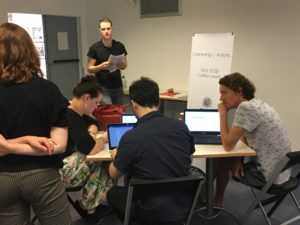HOPE not hate uses cookies to collect information and give you a more personalised experience on our site. You can find more information in our privacy policy. To agree to this, please click accept.
Interfaith, intercultural and inner identity organisations from across Europe met in Paris to create a coalition last week. The newly minted European Institute for Dialogue will coordinate activities, exchange best practices and issue joint statements.
When Zachary Gallant moved into the small town of Unkel in western Germany, he was the first – and only – Jew to live there since the Holocaust.
He was alarmed to notice how many Germans’ initial enthusiasm in welcoming refugees after the 2015 crisis waned and morphed into disappointment; so he decided to do something about it.
Working with both locals and refugees, Zachary opened a Bürgerpark – a people’s park. It includes a café, a bike self-repair stop and a green space for both locals and refugees to use and socialise.
“We’re trying to encourage meetings between locals and refugees so neither live in isolation. The US State Department actually views our efforts as countering violent extremism,” said Zachary last week in Paris.
Like representatives of a dozen other organisations working on dialogue between different faiths and communities, Zachary was attending a meeting on the 7 and 8 June to launch a network of interfaith organisations in Europe.
The aims of the coalition are to better coordinate interfaith efforts and use the different fields of expertise within the coalition to push out joint programmes and statements.

Rafael Tyszblat, head of Connecting Actions – an initiative to share best practices in intercultural dialogue – and acting president of the European Institute for Dialogue (EID), said he hopes the coalition will become a point of reference for Europe, one that “offers an alternative when engaging with the different and reverses the narrative of an impending clash between civilisations.”
Some of the organisations involved include Sharing Perspectives which designs virtual exchange programmes to facilitate intercultural dialogue, the Salaam Schalom initiative which counters racialisation and stigmatisation of Jews and Muslims in Germany, and the Muslim Jewish Conference, which promotes trust and collaboration between young Muslims and Jews across the world.
Lack of funding and visibility are recurring themes for many of these groups and the coalition is a means to tackle this.
Ilja Sichrovsky, founder of the Muslim Jewish Conference (MJC), said it’s amazing that they’ve managed to launch the institute after just three symposiums.
“When we started at MJC, we did not know which organisations were doing good work, or what was not working at all. One of the motivations for this exchange is that most of the organisations here are less than ten years old. Even a dentist goes to a conference once a year, so why not in our field?” He added.
Larissa Ziegler, who represented the Salaam-Schalom initiative, said she likes the mix of small and big organisations within the 12 founding members of the institute.
“If a problematic law is passed or a hate group is active, it will be good to have allies. The intellectual exchange and perspectives from different countries is also important.”
“Networking on a European level is especially important as we are a very small initiative and we need to collaborate to have impact,” she added.
Zachary agrees and says it’s good to show Unkel locals their initiative is internationally recognised.
EID will next be meeting in November 2018, and is open to other interfaith and dialogue organisations applying for membership.